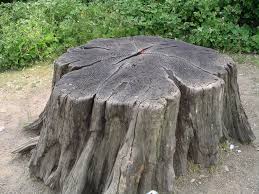stump
英 [stʌmp]
美 [stʌmp]
- n. 树桩;残余部分;假肢
- vt. 砍伐;使为难;在…作巡回政治演说
- vi. 笨重地行走;发表竞选演说
- n. (Stump)人名;(英)斯顿普;(德)施通普
使用频率:

记忆方法
兔子“死待”在那,守株待兔
1. stub => stump.
2. large tree stumps being a natural perch for rural orators (this custom is attested from 1775).
3. => 发表竞选演说.
4. step => stump.
1. stub => stump.
2. large tree stumps being a natural perch for rural orators (this custom is attested from 1775).
3. => 发表竞选演说.
4. step => stump.
中文词源
stump 树墩,树桩,绊倒,难倒
来自中古低地德语 stump,树桩,树墩, 来自 Proto-Germanic*stumpaz,树桩,树墩, 来自 PIE*stebh,支柱,支撑,来自 PIE*sta,站立,词源同 stand,staff.引申动词词义被树墩绊倒,比 喻义难倒等。
stump 脚步沉重的走,跺脚走来自 PIE*stebh,踩,踏,来自 PIE*sta,站立,词源同 stand,stamp,stomp.
英语词源
- stump (n.)
- "part of a tree trunk left in the ground after felling," mid-15c. (implied from late 13c. in surnames); from mid-14c. as "remaining part of a severed arm or leg;" from or cognate with Middle Low German stump (from adjective meaning "mutilated, blunt, dull"), Middle Dutch stomp "stump," from Proto-Germanic *stamp- (cognates: Old Norse stumpr, Old High German stumph, German stumpf "stump," German Stummel "piece cut off"), from PIE *stebh- "post, stem; to support" (see step (v.).
- stump (v.)
- early 13c., "to stumble over a tree-stump or other obstacle" (obsolete), from the source of stump (n.). From 1590s as "reduce to a stump." Sense of "walk stiffly and clumsily" is first recorded c. 1600. Sense of "baffle, bring to a halt by obstacles or impediments" is first recorded 1807, American English, perhaps in reference to plowing newly cleared land, but compare earlier sense "to challenge, dare" (1766).
Meaning "go on a speaking tour during a political campaign" is from 1838, American English, from phrase stump speech (1820), large tree stumps being a natural perch for rural orators (this custom is attested from 1775), especially in new settlements. Related: Stumped; stumping.
权威例句
- 1. The tramp produced a stump of candle from his deep pockets.
- 流浪汉从深口袋里掏出了一截蜡烛。
- 2. If you have a tree stump, check it for fungus.
- 要是有树桩的话,检查一下上面有没有长菌类。
- 3. The presidential candidates are on the stump today.
- 总统候选人今天在作巡回演说。
- 4. the stump of a pencil
- 铅笔头
- 5. He went on the stump in his home state.
- 他到故乡所在的州去发表演说.
